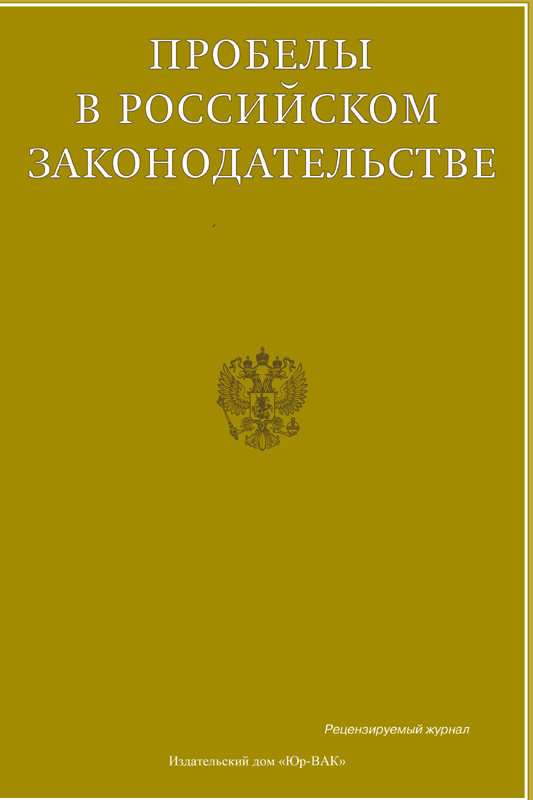Organization and Tactics of Working with Computer Traces at the Stage of Search and Cognitive Activity
- Authors: Komov A.V.1
-
Affiliations:
- Moscow University of the Ministry of Internal Affairs of Russia named after V. Ya. Kikot
- Issue: Vol 15, No 1 (2022)
- Pages: 131-136
- Section: Articles
- URL: https://journals.eco-vector.com/2072-3164/article/view/531588
- ID: 531588
Cite item
Abstract
Considering the organization and tactics of working with certain traces from a forensic point of view, it is necessary to understand that there is a division into forensic and forensic activities. Of particular practical importance in the identification, disclosure and investigation of economic crimes committed with the use of high technologies is the collection of computer traces at the stage of search and cognitive activity, which largely corresponds to forensic expertise. Which traces will be found at the scene of the incident will depend on which of them will be sent for research in laboratory conditions, which is largely determined by organizational and tactical considerations. At the same time, it is worth paying attention to the compliance of practical realities and the legal regulation of the participation of a specialist in the detection and removal of computer traces. A special place in working with computer traces is occupied by the level of training of employees of forensic and operational units, investigators and interrogators when working with computer traces, the relevance of the methodological recommendations used in this case, as well as technical equipment. That is why discussions on the creation of specially trained specialists for working with high technologies are currently becoming particularly relevant.
Full Text
About the authors
Andrey Vasilyevich Komov
Moscow University of the Ministry of Internal Affairs of Russia named after V. Ya. Kikot
Email: komoff.andrei2017@yandex.ru
Senior operative of the Department for countering the leaders of the criminal environment and organized criminal formations of Department No. 5 (for combating organized crime) UUR of the Ministry of Internal Affairs of Russia in the Kursk region, candidate of the Department of Criminology Moscow, Russia
References
- The Constitution of the Russian Federation (adopted by popular vote on 12.12.1993 with amendments approved during the All-Russian vote on 01.07.2020) / / SPS ConsultantPlus.
- Criminal Procedure Code of the Russian Federation No. 174-FZ of 18.12.2001 (as amended on 08.12.2020) (with amendments and additions, intro. effective from 19.12.2020) / / Collection of Legislation of the Russian Federation. 24.12.2001. No. 52 (part I). Article 4921.
- Federal Law No. 144-FZ of 12.08.1995 (as amended on 30.12.2020) "On Operational and investigative activities" / / Sobranie zakonodatelstva RF. 14.08.1995. No. 33. St. 3349.
- Decree of the President of the Russian Federation No. 490 of 10.10.2019 "On the development of artificial intelligence in the Russian Federation "(together with the "National Strategy for the development of artificial Intelligence for the period up to 2030"). 14.10.2019. No. 41. St. 5700.
- Resolution of the Plenum of the Supreme Court of the Russian Federation of 21.12.2010 No. 28 "On forensic expertise in criminal cases" / / Rossiyskaya Gazeta. № 296. 30.12.2010.
- Appeal decision of the Moscow City Court of 16.07.2020 in case no. 10-137/2020 // SPS ConsultantPlus
- Appeal ruling of the Moscow City Court of 04.09.2019 in case No. 10-139/2019 // SPS Consultantplus
- Balashova A. A. Electronic media of information and their criminal procedural use in proving: diss ... cand. yurid. sciences'. Moscow. 2020.
- Volynsky A. F. Organization of disclosure and investigation of crimes: problems and solutions // A Russian investigator. 2016. No. 1. p. 8.
- Gavrilin Yu. V. Electronic media of information in criminal proceedings / / Proceedings of the Academy of Management of the Ministry of Internal Affairs of Russia. 2017. No. 4 (44). p. 48.
- Grigoriev V. N., Maksimov O. A. The concept of electronic media in criminal proceedings / / Bulletin of the Ufa Law Institute of the Ministry of Internal Affairs of Russia. 2019. No. 2 (84). p. 40.
- Zazulin A. I. The validity of the use of the term "electronic information carrier" in the criminal Procedure Code of the Russian Federation " / / Law and Order: history, theory, practice. 2016. No. 4 (11). p. 56.
- Ivanov N. A. Proofs and sources of information in the criminal process: problems of theory and practice: monograph. M., 2015. pp. 96-97.
- Komov A.V. The concept and essence of virtual traces / / In the collection: Belgorod forensic readings. Collection of scientific papers. 2019. pp. 322-327.
- Kryazhev V. S. Search and cognitive activity in the disclosure and investigation of crimes: from the past to the present / / Siberian criminal procedure and criminalistic readings. 2020. No. 2 (28). pp. 55-64.
- Nekhoroshev A. B., Shukhnin M. N., Yurin I. Yu., Yakovlev A. N. Practical bases of computer-technical expertise. Educational and methodical manual. A scientific book. Saratov. 2007.
- Osipenko A. L., Gaidin A. I. Pravovoe regulirovanie i takticheskie osobennosti vypyatiya elektronnykh srednostei informatsii [Legal regulation and tactical features of the withdrawal of electronic media]. 2014. № 1.
- Pereverzeva E. S., Komov A.V. Virtual and digital traces: a new approach in understanding / / Bulletin of the St. Petersburg University of the Ministry of Internal Affairs of Russia. 2021. No. 1 (89). pp. 172-178.
- Usov A. I. Forensic research of computer tools and systems, fundamentals of methodological support. Training manual. Exam. Moscow. 2003.
- Fedotov I. S., Smagin P. G. Electronic data carriers: "material evidence" or "other documents" / / Vestnik VSU. Series: Law. 2014. No. 3. p. 195.
Supplementary files









